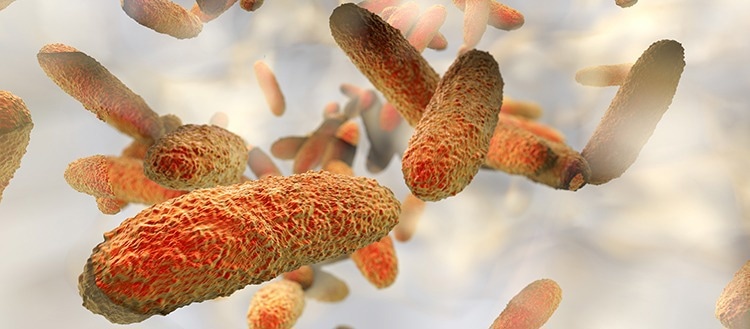The overuse of antibiotics has forced microorganisms to evolve defenses against this kind of treatment. Antibiotic resistance is a problem that the WHO now views as one of the major hazards to human health. A time when millions of people perished from salmonella or pneumonia could be returned if there is no treatment for multi-resistant bacteria.
 The bacterium Klebsiella pneumoniae is responsible for many infections, mainly in hospitals. Image Credit: iStock
The bacterium Klebsiella pneumoniae is responsible for many infections, mainly in hospitals. Image Credit: iStock
One of the pathogens that modern defenses are becoming ineffective against is the bacterium Klebsiella pneumoniae, which is quite prevalent in hospitals and is very virulent.
Edoxudine, an anti-herpes molecule identified in the 1960s, has been found by a team at the University of Geneva (UNIGE) to degrade Klebsiella bacterium’s protective surface, facilitating immune cells' easier elimination of the bacteria. The findings are available in the journal PLOS One.
Numerous urinary, intestinal, and respiratory tract infections are brought on by Klebsiella pneumoniae. Some of its strains can be lethal for 40% to 50% of infected people due to their resistance to the majority of common antibiotics and their high pathogenicity. To combat it, it is urgently necessary to discover new therapeutic molecules.
Since the 1930s, medicine has relied on antibiotics to get rid of pathogenic bacteria. But other approaches are possible, among which trying to weaken the bacteria’s defense system so that they can no longer escape the immune system. This avenue seems all the more promising as the virulence of Klebsiella pneumoniae stems largely from its ability to evade attacks from immune cells.”
Pierre Cosson, Research Lead and Professor, Department of Cell Physiology and Metabolism, Faculty of Medicine, University of Geneva
An amoeba as a model
The amoeba Dictyostelium served as an experimental model that the UNIGE researchers utilized to examine whether or not the bacteria were weakened. The same mechanisms that immune cells employ to destroy pathogens are used by this single-cell organism to capture and consume bacteria for food.
Cosson stated, “We genetically modified this amoeba so that it could tell us whether the bacteria it encountered were virulent or not. This very simple system then enabled us to test thousands of molecules and identify those that reduced bacterial virulence.”
Weakening the bacteria without killing them
Drug development is a time-consuming, expensive process with no assurance of success. Therefore, the UNIGE researchers decided to analyze currently available drugs to find potential uses for therapeutic targets that would be faster and safer.
The research team assessed how several currently available drugs, with a wide range of therapeutic indications, affected Klebsiella pneumoniae. Edoxudine, a drug intended to treat herpes, showed remarkable promise.
Cosson further added, “By altering the surface layer that protects the bacteria from their external environment, this pharmacological product makes it vulnerable. Unlike an antibiotic, edoxudine does not kill the bacteria, which limits the risk of developing resistance, a major advantage of such an anti-virulence strategy.”
The findings of this study are promising since edoxudine functions even on the most virulent strains of Klebsiella pneumoniae and do so at lower dosages than those used to treat herpes. However, the efficacy of such a treatment in humans has not yet been established.
“Sufficiently weakening the bacteria without killing them is a subtle strategy, but one that could prove to be a winner in the short and long terms,” concluded Cosson.
Source:
Journal reference:
Ifrid, E., et al. (2022). 5-ethyl-2’-deoxyuridine fragilizes Klebsiella pneumoniae outer wall and facilitates intracellular killing by phagocytic cells. PLOS One. doi.org/10.1371/journal.pone.0269093